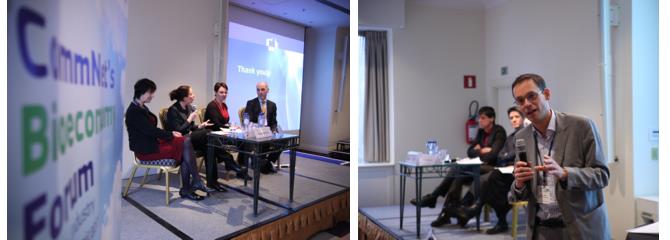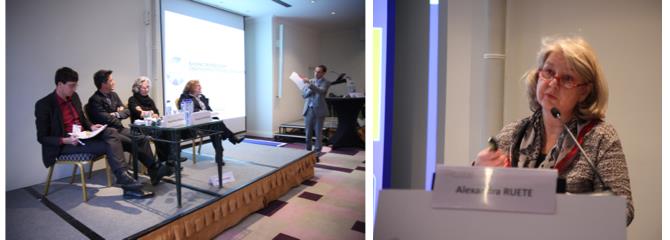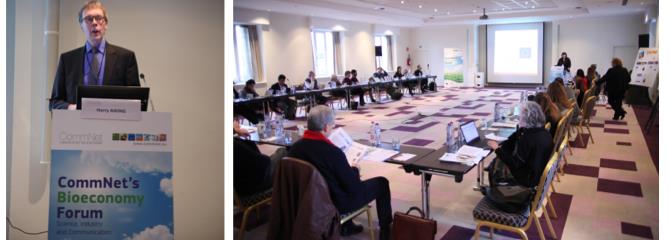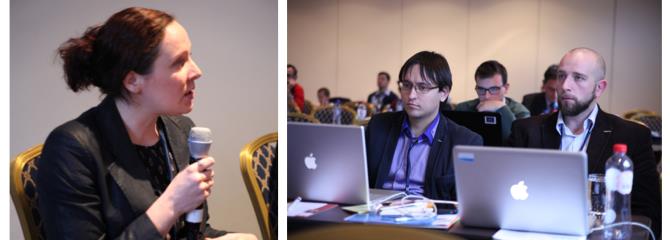CommNet, the network to communicate the bioeconomy, designed its annual forum in 2014 under the motto ‘Building the Bioeconomy – Creating Impact through Communication’. Two high-level keynote speakers demonstrated the range of the theme, reaching from targeted communication strategies for research projects to the necessity of awareness-raising for a system change in bioeconomy production chains - if sustainable food production for a growing world population is to be guaranteed.

‘Providing targeted information to multiple audiences in a strategic and effective manner’ will be the kind of future communication activities asked for from the EU Commission when granting new EU research funding. During her keynote, which also discussed the different standards of ‘open access’ in science communication, Alexandra Ruete, EU Communication Officer, pointed out, that future research communication ‘has to be more than just dissemination’. It should be well planned and reach out beyond the scientific community.
Attendees comments: "Most relevant to my area of work" – "The how to was a very concrete advice" – "Very good initiative. Should be organised more frequently."

In a session moderated by Thomas Dodd, Policy Office for the Bioeconomy, DG Research and Innovation, European Commission, CommNet members from participating EU-funded projects and partners of the consortium highlighted multi-faceted approaches to high impact communication. Examples here included possible pathways and pitfalls in advocating healthy nutrition towards young adults and the challenge of reaching possible investors or industry with innovations created in the project. The challenges of communicating to policy makers the benefits of EU research and the need for increased budgets for future-proofing topics such as the bioeconomy were addressed by the honourable Member of Parliament, EvaKaili, a member of the ITRE Committee and STOA chair, the parliament’s scientific technical options assessment body.
How awareness-raising will shape our food future was demonstrated in a brilliant lecture by Professor Harry Aiking from the Institute of Environmental Studies at the Free University of Amsterdam. People, planet and profit will be affected by resource scarcity and growing food demand.
"By 2050 – within 40 years! – we will need 60% more food to feed 2 billion more mouths. For food security we need to double the yield per hectare, and for sustainability we need to quarter our impacts per ton”, explained Professor Aiking.
Proposed solutions here include much more efficient use of resources, new irrigation and cropping systems, new protein plants, ‘war on food waste’ and a change of diets reducing overall protein intake by one third and replacing one third of proteins with plant proteins.

Following the speech, the Q&A panel identified a clear need for behavioural change, as well as a need to focus on more plant growth by mobilising underused land, through intensification of production, changes to the EU Common Agricultural Policy and by reducing food waste through better management and communications.
The contribution of EU-funded bioeconomy projects to tackle the challenges was emphasised during the ‘Business & Policy Dialogues’ in the interactive format – ‘when research meets industry and policy’. Eight projects from forestry research, agrifood chain and biobased products representing green plastics and green cosmetics took the opportunity to discuss the potential of their discoveries with technology transfer experts and with policy officers of different departments of the EU Commission such as Directorate-General for Regional and Urban Policy, Directorate-General for Agriculture and Directorate-General for Research and Innovation. Presenting projects showcased their studies and results with an article in the CommNet Innovation Catalogue – a special edition for 2014 which was launched during the Forum.

The event was completed by CommNet’s Final Conference with the spotlight on successful research communication projects demonstrating their approach to creating impact with science communication. Clearly well-planned and tailor-made communication with attention-raising angles proved most effective in reaching larger audiences. The best of these projects were rewarded with the CommNet Impact Award and certificates of honour.
To access all presentations, click on the link in the right column.
The access is restricted to members, so please login or create an account for free.